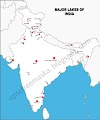Privy Purse
The then Home Minister of India, Sardar Vallabhai Patel and his Secretary V.P. Menon played a big role in persuading the princely states to join Indian Union and in the process an agreement was reached with respect to grant of an “annual fees” to the Ruler of Indian States or successor of such ruler recognised by the President. So, in this analysis, let us understand about Privy Purse and the reasons which led to its abolition in 1971.
Why was there a need for Privy Purse ?
• When the British Crown partitioned India and granted independence to the new Dominions of India and Pakistan, more than a third of the subcontinent was still covered by princely states, with rulers whose position and status within the Indian Empire had varied.
• In 1947, there were more than 560 such princely states in India, over which the British Crown had suzerainty but not sovereignty.
• In 1947, princely states numbering 555 covered 48% of area of pre-independent India and constituted 28% of its population. Relations with them were determined by subsidiary alliances and other treaties establishing indirect rule.
• By The Indian Independence Act 1947, the Crown abandoned its suzerainty, leaving the rulers of the states free to choose to accede either to India or to Pakistan, or to remain fully independent.
• Most of the States had been so dependent on the Government of India that they had little choice about accession. By the eve of independence, only a few states held out for complete independence after the British left India. Due to the diplomacy of Vallabhbhai Patel and VP Menon, Travancore, Bhopal and Jodhpur signed the instruments of accession before 15 August 1947. Even after independence three states vacillated, namely Jammu-Kashmir, Junagadh and Hyderabad which were integrated later into Indian Union.
• In consideration of such princely states signing the Instrument of Accession, the Government of India granted to them a ‘privy purse’, which was a specified sum of money that was payable annually to the rulers of such States.
Questions on ‘Privy Purse’
• The payments of ‘privy purse’ were made to the former rulers under constitutional provisions of Art. 291 and Art. 362. However, it was often questioned as a relic of the colonial past.
• Privy Purse conferred ‘special status’ to ruling class, which continued the British practice of ruler and ruled. However,this went against the idea of “equality” and egalitarianism as enshrined in the Constitution of India.
• Moreover, ‘privy purse’ was an added economic pressure on a newly born independent nation, that was ridden with poverty, hunger and security challenges.
• Even India’s first Prime Minister Jawaharlal Nehru was not very much in favour of giving annual fees to the rulers of former Indian States but had to accede considering a long term bargain for their accession to Indian Union.
The Circumstances in which Privy Purse was abolished in India
• Granting of an assured sum of money to the royal family by the government was seen as a move against the common public and this plank was utilised by Mrs. Indira Gandhi to consolidate her position in the eyes of Indian public when the old timers in Congress Party revolted against her.
• Mrs. Indira Gandhi as Prime Minister, first in 1970 tried to bring a constitution amendment to abolish Privy Purse but the move was shot down in Rajya Sabha. It was then issued as an ordinance which was struck down by Supreme Court.
• So, during the election campaign of 1971 after nationalisation of banks, Mrs. Gandhi made abolition of Privy Purse as a major election issue and convinced the public that the move was for the public welfare and against the wealthy and rich. This move paid her rich political dividend as she won 1971 election by a thumping majority winning 352 seats in Lok Sabha.
• Thus, the Prime Minister Mrs. Indira Gandhi moved Constitution (Twenty Sixth Amendment) Act, 1971 which eventually abolished Privy Purse in India by omitting Article 291 and 362 in the Indian Constitution.
• The Constitution Twenty Sixth Amendment further added Article 363A in the Constitution which not only ceased recognition granted to Rulers of Indian States but also abolished Privy Purse in India.
Reasin for abolition of ‘Privy Purse’
• The abolition of privy purse was needed because it went against the idea of equal rights for all citizens, as enshrined under fundamental rights of Indian constitution.
• The concept of rulership, with ‘privy purse’ and special privileges was incompatible with principles of democracy, equality and social justice and it was unrelated to any current functions and social purposes including an egalitarian social order.
• Since, the government came into power on socialist promises; hence the priority of the government was to spend more on social welfare. Further, influx of refugees from Bangladesh also had added pressure on Indian exchequer. So, the government decided to abolish Privy Purse to ease its economic burden.







0 Comments
Feel free to ask any doubt in comment section